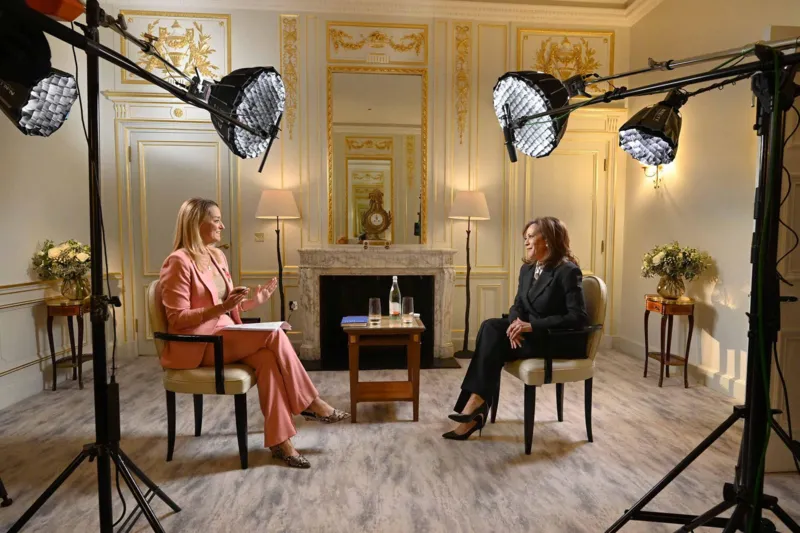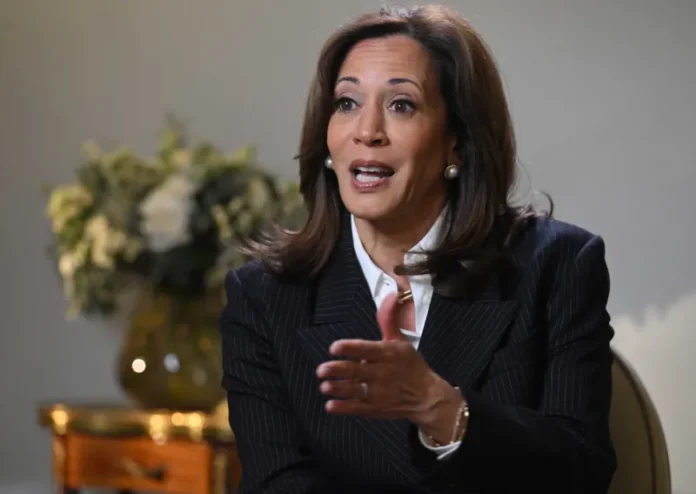Former U.S. vice-president Kamala Harris has strongly signalled she is weighing another White House run in 2028, telling the BBC’s Laura Kuenssberg she is “possibly” willing to be president one day and insisting she has not finished in public life.
In a wide-ranging interview that mixed personal reflection, political criticism and fierce warnings about threats to democracy, Harris also branded Donald Trump a “tyrant” and defended the decisions and instincts that shaped her brief 2024 presidential campaign.
Harris — who took the stage in London while on a book tour for her memoir 107 Days — rejected poll-driven narratives that write her off, insisting she does not make choices based on short-term popularity measures and arguing that the truncated nature of her 2024 bid left her little time to build the relationships and policy case she would have needed to prevail.
“I am not done,” she told Kuenssberg. “I have lived my entire career as a life of service and it’s in my bones.”
Asked directly whether she could see herself as president, Harris answered, “Possibly,” while also predicting with certainty that a woman will occupy the White House in her lifetime.
Why She Says a Second Run is “Possible”
Harris framed any future decision as part of a long arc of public service, not a reflexive ambition.
She argued that the short 107-day campaign after President Joe Biden’s withdrawal from the 2024 race left her unable to fully present the case she would have liked on bread-and-butter issues such as housing and childcare — topics she believes are key to winning back working-class voters who drifted away from the Democrats.

She also pushed back on the idea that poll numbers should dictate her choices.
“If I listened to polls I would have not run for my first office, or my second office — and I certainly wouldn’t be sitting here,” she said, reminding viewers that many successful political careers began when odds looked long.
Harris described her book and the interviews that follow as part of a process of accountability and explanation: a candid attempt to set out what happened in the chaotic weeks between Biden’s exit and the 2024 election, and to argue that structural and timing problems — not simply her candidacy’s flaws — helped shape the result.
Blunt Verdict on Trump: “He’s Weaponised Power”
The interview’s most pointed moments were Harris’s attacks on Donald Trump and his first months back in office.
She accused the president of turning federal agencies into instruments of political pressure and suggested that his administration’s actions have confirmed warnings she made on the campaign trail about authoritarian tendencies.
“He said he would weaponise the Department of Justice — and he has done exactly that,” she said, citing recent high-profile moves she views as politically motivated enforcement. Harris also criticised business leaders and institutions that, she claims, have “capitulated” to Trump to curry favour or avoid scrutiny.
Her comments drew a brisk rebuttal from the White House, which dismissed her remarks as the sour intuitions of a defeated candidate.
Reflections on the 2024 Campaign and Biden
Harris acknowledged the shock and pain of losing to Trump, describing the aftermath as a moment of “trauma” for her team.
She reiterated criticisms from 107 Days about the decision-making that kept Biden in the race for as long as he did, arguing that the short window to pivot made an already difficult task near impossible.
Still, Harris carefully balanced critique with loyalty to Biden. She described the dynamics inside the campaign and the White House as fraught and sometimes contradictory — but maintained she would not publicly undermine her former running mate.
The interview included candid recollections of tense moments within Democratic circles and Harris’s own frustrations about the level of institutional support she received.
Political Posture and the Democratic Party’s Future
Beyond personal politics, Harris debated larger questions confronting the Democratic Party: how to reconnect with working-class voters, whether the party needs a clearer economic message, and how to challenge a right-wing populist opposition.
She argued for a campaign that better speaks to everyday economic concerns while standing firm against democratic erosion.
Her willingness to consider 2028 keeps a high-profile national figure in play at a time when Democrats are still searching for leaders who can both unify the coalition and combat Trump’s political machine.
Reaction and What Comes Next
The interview is likely to intensify speculation in Washington about whether Harris will make the leap to a full-blown 2028 campaign.
Meanwhile, the book tour and television appearances will keep Harris in the public eye and help her shape the argument she hopes to make to voters and donors going forward.
Harris’s greatest challenge — if she runs again — will be translating the personal resilience she emphasises into a clear and persuasive program of policy and outreach that wins back the diverse coalition that delivered Democratic success in previous election.
The last time, many US electorates did believe she had a good grasp of what the problems are, and a clear roadmap to solving them. Has she had enough time to think them through now?
Rate, Like 👍, Comment 💬, Share this article, Follow us on our social media handles, and Submit your own story to get featured and earn rewards!






